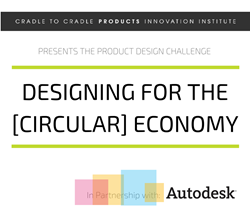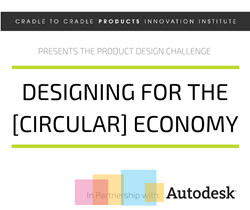Cradle to Cradle Products Innovation Institute and Autodesk Announce Winners of Inaugural Product Design Challenge


SAN FRANCISCO (PRWEB) April 30, 2015
The Cradle to Cradle Products Innovation Institute and Autodesk, a world leader in 3D design software, today announced the winners of the inaugural Product Design Challenge, which tasked participants to design products made with materials that can return safely to industry or nature at the end of use as fulfilling a core criterion of “remaking the way we make things.”
The design challenge celebrates the movement toward a world filled with Cradle to Cradle Certified™ products that feature innovative material selection and design with awareness that throwing something “away” is no longer a viable option. Instead, these designers are participating in a circular economy, where valuable resources are perpetually recycled. A US$ 2,000 cash prize has been awarded to winners in three categories: Best Student Project, Best Professional Project, and Best Use of the Autodesk Fusion 360 Tool.
“The design revolution starts with the designers. We congratulate our winners as next generation product designers who embrace systems thinking to solve human and environmental challenges,” said Bridgett Luther, president of the Institute. “We plan to further develop the program and foster a community of practice who share best practices for making products that earn the Cradle to Cradle Certified mark for excellence in quality, beauty and sustainability. We appreciate the support from the Alcoa Foundation and our partnership with Autodesk in helping us bring this program to the world.”
Awarded for Best Student Project, Tjitte de Wolff of the University of Twente in the Netherlands created the Venlo Bag, a 100% biodegradable bag made from 99% recycled materials meant to combat the pollution that is caused by the harmful plastic bags shoppers around the world use to take their purchases home.
“The demand for cheap, single-use shopping bags will still exist,” said de Wolff. “Therefore a Cradle to Cradle solution for plastic bags not only eliminates pollution, but also contributes to a healthy eco-system following the credo: do more good, rather than less bad.”
Jerri Hobdy, an emerging furniture designer and Savannah College of Art and Design (SCAD) graduate, took home the award for Best Professional Design with PURE|IF|HIDE, a chair and stool collection designed to fill a market need for refined, residential furniture. Hobdy’s ample use of recyclable materials, such as solvent-free, vegetable tanned leather and steel, combined with thoughtful design creates a product that can be separated into reclaimable biological and technical nutrients at the end of its use. The design accommodates easy recyclability, repair and refurbishment with new leather and colors.
Cole Smith, a student at Virginia Polytechnic Institute’s school of Industrial Design has been awarded with Best Use of the Autodesk Fusion 360 Tool for his design of the Finite Faucet, which is geared to help public restroom faucet users learn how to wash their hands correctly while reminding users of their impact on the environment.
“Without the Autodesk Fusion 360 modeling tools, I would only have sketches and a vague idea of how my product could actually function,” said Smith. “It’s one thing to sketch out an idea on paper, but quite another to figure out if the valves and switches will physically work. Fusion 360 made it much easier to measure and tweak the volumes and relative sizes of my parts to promote the Center for Disease Control’s guidelines for hand washing.”
The Finite Faucet is designed with a clear upper cylinder that acts as a visual monitor of water usage and drains until it is empty, at which point it must be turned off to refill and upon doing so, acts as a timer for scrubbing hands. The design also addresses sanitation concerns and water conservation by moving the stainless steel handle into the sink rather than out of reach of the stream.
The design challenge attracted participants from 16 countries, including Australia, India, the Netherlands, and the United States. Product entries were from diverse sectors, including home and furniture; outdoor, landscape and garden; electronic and entertainment; vehicles and structures; apparel and others. Of the entries submitted, 20 percent employed Autodesk Fusion 360, an integrated 3D Computer-Aided Design (CAD)/Computer-Aided Manufacturing (CAM) tool for product development that powers industrial design, mechanical engineering, and manufacturing with cloud-based collaboration.
“With 10 billion people soon to be living on the planet with finite amount of resources, designing for a circular economy is the only way forward. Solving today’s epic challenges requires bold new approaches to how we design and make things. Creative young talent in many cases is leading the charge, leaving the linear economy in the dust,” said Lynelle Cameron, senior director of Sustainability and Philanthropy, Autodesk.
In addition to the three winners, the judges awarded Honorable Mention to a team of students from Pratt Institute. The design, aptly called “MetroWay,” was inspired by the high-traffic commuter system of New York City. The team devised a thoughtful Cradle to Cradle-inspired product that emphasizes material choice, improves recovery of material stock, and instills regenerative solutions through a Circular Economic Model.
Participants submitted their design after completing the free 1-hour, online course Designing Cradle to Cradle Certified Products for the Circular Economy, which was made possible by the Alcoa Foundation. The online education course was developed in partnership with Autodesk and provides practical instruction for product designers as they move toward Cradle to Cradle certification.
To learn more about Cradle to Cradle Certified products and certification, visit C2CCertified.org. The design challenge is expected to return Fall 2015. Stay tuned at C2CCertified.org/Challenge for more information on how to participate.
###
About Cradle to Cradle Products Innovation Institute
The Cradle to Cradle Products Innovation Institute is a non-profit organization whose mission is to turn the making of things into a positive force for people, the economy, and the planet. It administers the Cradle to Cradle Certified™ Product Program, a guidance-system for assessing and continually improving products based upon five sustainability characteristics: material health, material reuse, renewable energy, water stewardship, and social fairness. The Institute is headquartered in San Francisco with satellite offices in Amsterdam, NL, Venlo, NL and Raleigh, NC.
Cradle to Cradle Certified™ is a certification mark licensed exclusively to the Cradle to Cradle Products Innovation Institute.